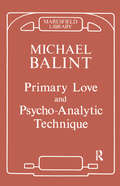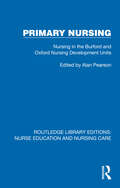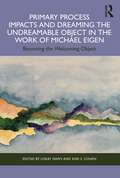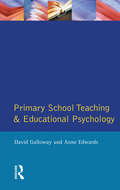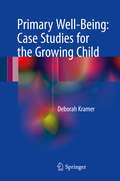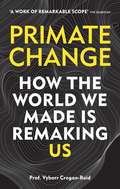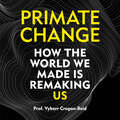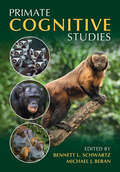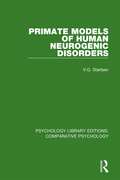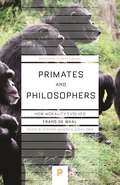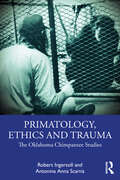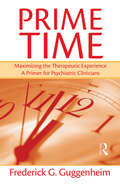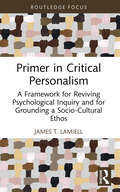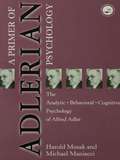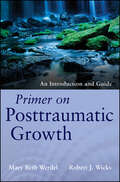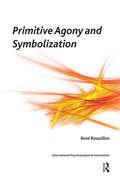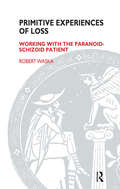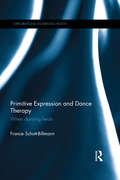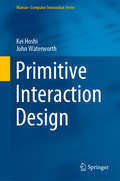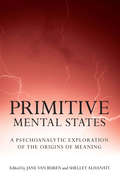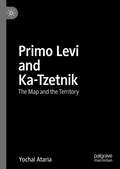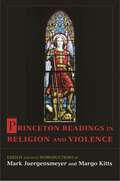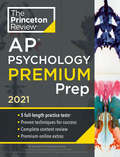- Table View
- List View
Primary Love and Psychoanalytic Technique (International Behavioural And Social Sciences Ser. #Vol. 88)
by Michael BalintOne of the eternal problems of mankind is that of love and hate. Why and how does it happen that we love this one of our fellow-men, feel safe in his affection, expect satisfactions of our needs from him and are attracted to him, while we hate and avoid other? Ever since the publication of Freud's first works one of the main objects of psycho-analytic research has been the study of these powerful currents of the human mind. The author contributed several important papers on this subject, and Primary Love and Psychoanalytic Technique is a collection of his material from 1930 to 1952. The first half of this volume is a collection of all his papers on this topic. The first, "Psycho-Sexual Parallels to the Fundamental Law of Biogenetics", is an attempt to trace the development of the erotic instincts from their earliest biological beginnings in unicellular organisms to their highest manifestations in human beings. Other papers deal with the problems of "Genital Love". "Transference of Emotions", of "Love and Hate" and so on.
Primary Nursing: Nursing in the Burford and Oxford Nursing Development Units (Routledge Library Editions: Nurse Education and Nursing Care)
by Alan PearsonPrimary nursing is a system of care which reinstated the skilled professional nurse at the forefront of practical nursing care. Originally published in 1988, this book presents an argument, based on contemporary literature and on the practice in the former Burford and Oxford nursing development units, to support the introduction of primary nursing and nursing beds in general hospitals. It focuses on the philosophy of individualised patient care delivered by a professional nursing service and based on a close, therapeutic relationship between nurse and patient. Innovations included the abandoning of stereotyped nurse uniforms, the sharing of mealtimes by patients and nurses, and the use of therapeutic touch and massage. Having been implemented and evaluated, the units enjoyed an international reputation.
Primary Process Impacts and Dreaming the Undreamable Object in the Work of Michael Eigen: Becoming the Welcoming Object
by Loray Daws Keri S. CohenPrimary Process Impacts and Dreaming the Undreamable Object in the Work of Michael Eigen examines Eigen’s rich phenomenological work on becoming a welcoming object.The contributors to this collection explore the core theme with reference to key Eigen works including Feeling Matters and Contact with the Depths. As a primary process psychoanalyst, Eigen’s writing reflects a unique rhythm of faith that is able to "revivify" union-distinction body-affect-thinking potentialities within a creative psychoanalytic dyad. In this book, alongside its companion volume, Toxic Nourishment and Damaged Bonds in the Work of Michael Eigen, contemporary Eigen readers and writers articulate the various welcoming processes and attitudes needed to cultivate a "Hearing Heart," a central ingredient in reaching and touching those parts of self-deemed unwanted, unwelcomed, and even traumatized. Primary Process Impacts and Dreaming the Undreamable Object in the Work of Michael Eigen represents a wide range of psychoanalytic perspectives, and the chapters describe the genius of Eigen as well as contribute their own clinical and academic acumen.Presenting a key aspect of Michael Eigen's transformational aesthetic, this book will be of great interest to psychoanalysts, psychotherapists, and all those with an interest in psychoanalytic and spiritual psychology.
Primary School Teaching and Educational Psychology (Effective Teacher, The)
by Anne Edwards David GallowayDrawing upon extensive research, David Galloway and Anne Edwards analyse the increasing pressures on teachers from the national curriculum and other recent legislation. They look carefully at childrens' learning and behavioural difficulties and show how educational psychology can extend our understanding of teacher's day-to-date work in the classroom. Primary Teaching and Educational Psychology is a refreshing and at times controversial examination of primary teaching and the application of educational psychology. It will be essential reading for trainee teachers and will stimulate more experienced teachers to re-evaluate their current practices.
Primary Well-Being: Case Studies for the Growing Child
by Deborah KramerThis book offers solutions on how to enhance the normal development of the well child incorporating complementary medicine. The primary care provider is the only healthcare professional to see every child (0-18) and their parent, and can assess the child's health and advise parents on how to provide a healthy environment and important practices to nurture healthy children. The book provides realistic scenarios encountered by new nurse practitioners in their clinical training. It is structured in a question and answer framework to help practitioners critically think through the best practices to be implemented during the well child visit and develop a plan of action for the family. This book provides assessment and diagnostic criteria and tools and presents common developmental and behavioral issues for each age group. The book promotes the role of professional as advocate by making recommendations for broad social policies to help all children succeed.
Primate Change: How the world we made is remaking us
by Vybarr Cregan-Reid'A work of remarkable scope' - GuardianFT Best science books of 2018Primate Change has been adapted into a radio series for the BBC WORLD SERVICE.*This is the road from climate change to primate change.PRIMATE CHANGE is a wide-ranging, polemical look at how and why the human body has changed since humankind first got up on two feet. Spanning the entirety of human history - from primate to transhuman - Vybarr Cregan-Reid's book investigates where we came from, who we are today and how modern technology will change us beyond recognition.In the last two hundred years, humans have made such a tremendous impact on the world that our geological epoch is about to be declared the 'Anthropocene', or the Age of Man. But while we have been busy changing the shape of the world we inhabit, the ways of living that we have been building have, as if under the cover of darkness, been transforming our bodies and altering the expression of our DNA, too.Primate Change beautifully unscrambles the complex architecture of our modern human bodies, built over millions of years and only starting to give up on us now.'Our bodies are in a shock. Modern living is as bracing to the human body as jumping through a hole in the ice. Our bodies do not know what century they were born into and they are defending and deforming themselves in response.'
Primate Change: How the world we made is remaking us
by Vybarr Cregan-ReidIF YOU THINK YOU ARE YOU, THINK AGAIN.PRIMATE CHANGE is a wide-ranging, polemical look at how and why the human body has changed since humankind first got up on two feet. Spanning the entirety of human history - from primate to transhuman - Vybarr Cregan-Reid's book investigates where we came from, who we are today and how modern technology will change us beyond recognition.In the last two hundred years, humans have made such a tremendous impact on the world that our geological epoch is about to be declared the 'Anthropocene', or the Age of Man. But while we have been busy changing the shape of the world we inhabit, the ways of living that we have been building have, as if under the cover of darkness, been transforming our bodies and altering the expression of our DNA, too.PRIMATE CHANGE beautifully unscrambles the complex architecture of our modern human bodies, built over millions of years and only starting to give up on us now.'Our bodies are in a shock. Modern living is as bracing to the human body as jumping through a hole in the ice. Our bodies do not know what century they were born into and they are defending and deforming themselves in response'
Primate Change: How the world we made is remaking us
by Vybarr Cregan-ReidIF YOU THINK YOU ARE YOU, THINK AGAIN.PRIMATE CHANGE is a wide-ranging, polemical look at how and why the human body has changed since humankind first got up on two feet. Spanning the entirety of human history - from primate to transhuman - Vybarr Cregan-Reid's book investigates where we came from, who we are today and how modern technology will change us beyond recognition.In the last two hundred years, humans have made such a tremendous impact on the world that our geological epoch is about to be declared the 'Anthropocene', or the Age of Man. But while we have been busy changing the shape of the world we inhabit, the ways of living that we have been building have, as if under the cover of darkness, been transforming our bodies and altering the expression of our DNA, too.PRIMATE CHANGE beautifully unscrambles the complex architecture of our modern human bodies, built over millions of years and only starting to give up on us now.'Our bodies are in a shock. Modern living is as bracing to the human body as jumping through a hole in the ice. Our bodies do not know what century they were born into and they are defending and deforming themselves in response'(p) 2018 Octopus Publishing Group
Primate Cognitive Studies
by Bennett L. Schwartz Michael J. BeranResearchers have studied non-human primate cognition along different paths, including social cognition, planning and causal knowledge, spatial cognition and memory, and gestural communication, as well as comparative studies with humans. This volume describes how primate cognition is studied in labs, zoos, sanctuaries, and in the field, bringing together researchers examining similar issues in all of these settings and showing how each benefits from the others. Readers will discover how lab-based concepts play out in the real world of free primates. This book tackles pressing issues such as replicability, research ethics, and open science. With contributors from a broad range of comparative, cognitive, neuroscience, developmental, ecological, and ethological perspectives, the volume provides a state-of-the-art review pointing to new avenues for integrative research.
Primate Models of Human Neurogenic Disorders (Psychology Library Editions: Comparative Psychology)
by V.G. StartsevOriginally published in 1976, this volume reports research that will help us to understand the causes of psychogenic diseases. It deals both experimentally and theoretically with the question of symptom specificity in psychosomatic research – why some individuals respond to psychological stress with gastric disorders, others with sexual impotence, and still others with high blood pressure. As the author notes in summarizing his conclusions, "The repeated pairing of activation of a given organic system with intense nervous stress directs the pathological influence of the stressor primarily upon the system activated; subsequently the natural stimuli which would ordinarily activate the system in a normal manner sustain the pathological stressor’s effect as a conditioned stimulus for the stressor effect." The translation of this work from the original Russian brings to the attention of Western investigators new and useful models of stress-induced disorders, and sheds new light on the pervasive problem of psychosomatic disease.
Primate Psychology
by Dario MaestripieriIn more ways than we may sometimes care to acknowledge, the human being is just another primate--it is certainly only very rarely that researchers into cognition, emotion, personality, and behavior in our species and in other primates come together to compare notes and share insights. This book, one of the few comprehensive attempts at integrating behavioral research into human and nonhuman primates, does precisely that--and in doing so, offers a clear, in-depth look at the mutually enlightening work being done in psychology and primatology. Relying on theories of behavior derived from psychology rather than ecology or biological anthropology, the authors, internationally known experts in primatology and psychology, focus primarily on social processes in areas including aggression, conflict resolution, sexuality, attachment, parenting, social development and affiliation, cognitive development, social cognition, personality, emotions, vocal and nonvocal communication, cognitive neuroscience, and psychopathology. They show nonhuman primates to be far more complex, cognitively and emotionally, than was once supposed, with provocative implications for our understanding of supposedly unique human characteristics. Arguing that both human and nonhuman primates are distinctive for their wide range of context-sensitive behaviors, their work makes a powerful case for the future integration of human and primate behavioral research.
Primates and Philosophers: How Morality Evolved (Princeton Science Library #43)
by Frans de WaalCan virtuous behavior be explained by nature, and not by human rational choice? "It's the animal in us," we often hear when we've been bad. But why not when we're good? Primates and Philosophers tackles this question by exploring the biological foundations of one of humanity's most valued traits: morality. In this provocative book, renowned primatologist Frans de Waal argues that modern-day evolutionary biology takes far too dim a view of the natural world, emphasizing our "selfish" genes and reinforcing our habit of labeling ethical behavior as humane and the less civilized as animalistic. Seeking the origin of human morality not in evolution but in human culture, science insists that we are moral by choice, not by nature. Citing remarkable evidence based on his extensive research of primate behavior, de Waal attacks "Veneer Theory," which posits morality as a thin overlay on an otherwise nasty nature. He explains how we evolved from a long line of animals that care for the weak and build cooperation with reciprocal transactions. Drawing on Darwin, recent scientific advances, and his extensive research of primate behavior, de Waal demonstrates a strong continuity between human and animal behavior. He probes issues such as anthropomorphism and human responsibilities toward animals. His compelling account of how human morality evolved out of mammalian society will fascinate anyone who has ever wondered about the origins and reach of human goodness. Based on the Tanner Lectures de Waal delivered at Princeton University's Center for Human Values in 2004, Primates and Philosophers includes responses by the philosophers Peter Singer, Christine M. Korsgaard, and Philip Kitcher and the science writer Robert Wright. They press de Waal to clarify the differences between humans and other animals, yielding a lively debate that will fascinate all those who wonder about the origins and reach of human goodness.
Primatology, Ethics and Trauma: The Oklahoma Chimpanzee Studies
by Robert Ingersoll Antonina Anna ScarnàPrimatology, Ethics and Trauma offers an analytical re-examination of the research conducted into the linguistic abilities of the Oklahoma chimpanzees, uncovering the historical reality of the research. It has been 50 years since the first language experiments on chimpanzees. Robert Ingersoll was one of the researchers from 1975 to 1983. He is well known for being one of the main carers and best friend of the chimpanzee, Nim Chimpsky, but there were other chimpanzees in the University of Oklahoma's Institute for Primate Studies, including Washoe, Moja, Kelly, Booee, and Onan, who were taught sign language in the quest to discover whether language is learned or innate in humans. Antonina Anna Scarnà’s expertise in language acquisition and neuroscience offers a vehicle for critical evaluation of those studies.Ingersoll and Scarnà investigate how this research failed to address the emotional needs of the animals. Research into trauma has made scientific advances since those studies. It is time to consider the research from a different perspective, examining the neglect and cruelty that was inflicted on those animals in the name of psychological science. This book re-examines those cases, addressing directly the suffering and traumatic experiences endured by the captive chimpanzees, in particular the female chimpanzee, Washoe, and her resultant inability to be a competent mother.The book discusses the unethical nature of the studies in the context of recent research on trauma and offers a specific and direct psychological message, proposing to finally close the door on the language side of these chimpanzee studies. This book is a novel and groundbreaking account. It will be of interest to lay readers and academics alike. Those working as research, experimental, and clinical psychologists will find this book of interest, as will psychotherapists, linguists, anthropologists, historians of science and primatologists, as well as those involved in primate sanctuary and conservation.
Prime Time: Maximizing the Therapeutic Experience -- A Primer for Psychiatric Clinicians
by Frederick G. GuggenheimOne of the difficulties that all psychiatrists encounter when they see patients for less than fifty minutes is how to be empathic while on the run. Nowadays the psychiatrist, often behind schedule, has but a Twenty Minute Hour to evaluate a patient’s level of functioning and current symptoms and side effects; to judge their responsiveness to medication; to do some teaching about medication and/or disease management; and finally to complete the chart. Prime Time gives pointers from an experienced clinician on how to deal more effectively and efficiently within time constraints. It is designed to assist psychiatrists with medication and evaluation, and to allow for psychotherapy in addition to the requisite psychopharmacology. The primer provides a number of short cuts and clinical maneuvers in initiating and ending sessions that can help promote positive transference, assist effective flow of information, and aid in closing out the session without falling behind schedule.
Primer in Critical Personalism: A Framework for Reviving Psychological Inquiry and for Grounding a Socio-Cultural Ethos (ISSN)
by James T. LamiellThis insightful book offers contemporary psychologists and other social theorists an understanding of the comprehensive system of thought developed by the German scholar William Stern (1871–1938) known as critical personalism.Expanding the author’s ongoing efforts in this area, the book considers, firstly, how critical personalism could ground a needed revival of psychological science, a need created by the field's gradual transformation, through its widespread adoption of aggregate statistical methods of investigation, into a discipline better characterized as 'psycho-demography.' Consistent with Stern's own view of the potential of critical personalism vis-a-vis socio-ethical concerns, the book then explores how the framework could facilitate a transcendence of thinking about racial and other social relationships beyond currently prevailing narratives about personkinds into narratives that are actually about persons. This part of the book includes a chapter discussing Stern's own historical efforts in this direction, serving to highlight the non-individualistic nature of critically personalistic thinking. Throughout, Lamiell constructs a clear case for the merits and applicability of critical personalism in modern psychology and social thought.Primer in Critical Personalism will interest established psychological scientists and advanced students in the field, as well as those who are concerned about our contemporary socio-cultural ethos and the prospects for its improvement, including philosophers, sociologists, educators, journalists, clerics, and thoughtful laypersons alike.
Primer of Adlerian Psychology: The Analytic - Behavioural - Cognitive Psychology of Alfred Adler
by Harold Mosak Michael ManiacciA Primer of Adlerian Psychology offers an accessible, yet very learned, introduction to Adlerian Psychology. Also known as Individual Psychology, the approach stresses the unity of the individual, the subjective choices he or she makes and the goals the individual works towards he or she moves through life. Therapists can apply this theory in a variety of settings with populations of all ages, making it a highly practical and valuable approach. Written by two scholars with extensive knowledge and experience in this school of thought, this book covers the basic tenets of Individual Psychology geared toward those students and clinicians who are yet unfamiliar with Adler's work.
Primer on Posttraumatic Growth
by Robert J. Wicks Mary Beth Werdel"From the inspiring chapter quotes, to relevant historical and current research, to practical clinical directions, Primer on Posttraumatic Growth takes a giant step toward both grounding us and moving us ahead with strong hope for adjustment and growth in the post-trauma/loss world. This is a comprehensive, practical, and readable work that should be at hand for any mental health clinician, pastoral care professional, or student preparing for these professions. " --J. Shep Jeffreys, EdD, FT, author of Helping Grieving People--When Tears Are Not Enough: A Handbook for Care Providers, Second Edition A guide for helping your clients overcome negative events, based on the latest research on posttraumatic growth Drawing on the growing empirical and theoretical material on posttraumatic growth--an outgrowth of the positive psychology movement--Primer on Posttraumatic Growth provides insight, depth, and treatment recommendations for both the clinicians who work with those who have experienced dramatic negative events in their lives and for other professionals who support victims of trauma and extreme stress. This essential primer examines: The connections between meaning and growth The impact of cognitive processing on posttraumatic growth Positive emotion and posttraumatic growth Posttraumatic growth and an "open" personality The human drive to be in positive and important interpersonal relationships Forgiveness: can it be extended towards all areas of posttraumatic growth? Posttraumatic growth and religious and spiritual variables Wisdom and posttraumatic growth
Primitive Agony and Symbolization (The International Psychoanalytical Association Psychoanalytic Ideas and Applications Series)
by Rene RoussillonThe fundamental outlook of this book is clinical. It attempts to establish a unitary model of the processes at work in different forms of narcissistic pathology, and to offer a model that is both an alternative to, and complementary to, Freud's model of what are usually considered to be neurotic problems. The aim is to extract a sequence of mental processes that could be seen as typical of narcissistic disturbances of the sense of identity, with their several forms and clinical variations. The book describes how these are structured, together with their intrapsychic and intersubjective functions, based on the hypothesis of a defensive pattern that is set up to counter the effect of a split-off primary trauma and the threat that hangs over the mind and subjectivity.
Primitive Experiences of Loss: Working with the Paranoid-Schizoid Patient
by Robert WaskaTaking as his starting point Melanie Klein's concept of the paranoid-schizoid position, and succinctly reviewing subsequent developments within the Kleinian perspective, the author formulates a distinctive and subtle argument concentrated on the topic of primitive loss. It is the author's conviction that the experience of loss has a primacy within the paranoid-schizoid position but that this has received insufficient and inadequate recognition, with significant implications for analytic technique. With this standpoint as his orienting focus, the author provides a finely-textured and penetrating discussion of such issues as projective identification, symbolization, transference and counter transference. A thoughtful and perceptive examination of theoretical issues is buttressed with substantial illustrative case material throughout. Calling for further work to be done in refining and clarifying the understanding of loss, and its intrapsychic, interpersonal and technical ramifications, the present volume represents a significant contribution and stimulus to that task
Primitive Expression and Dance Therapy: When dancing heals (Explorations in Mental Health)
by France Schott-BillmannThis book provides a rigorous and comprehensive account of primitive expression in dance therapy, focusing on the use of rhythm and exploring the therapeutic potential inherent in the diverse traditions of popular dance, from tribal shamanic dance to styles such as rock, rap and hip-hop strongly present in our contemporary society. Drawing on the author’s vast experience in the field of dance therapy, the book examines biological, psychological and anthropological foundations of rhythm based therapies, considering their roots in biological rhythms such as the heartbeat and using such rhythms in therapy. Chapters include: • The link between animal and man: ethology • Shamanism• Gestural symmetry coupling with the other• Bilateralism as structuring dialogue• Rhythm dance therapy• New fields in the application of dance therapy. Clinical examples are provided throughout the book to comprehensively demonstrate how dance rhythm therapy can contribute to the use of the arts therapies. It offers a fresh perspective for researchers, psychotherapists and clinicians who want to use dance therapy techniques, as well as arts therapists and those who want to learn more about artistic and cultural dance.
Primitive Interaction Design (Human–Computer Interaction Series)
by John Waterworth Kei HoshiInteraction design is acknowledged as an important area of study, and more especially of design practice. Hugely popular and profitable consumer devices, such as mobile phones and tablets, are seen as owing much of their success to the way they have been designed, not least their interface characteristics and the styles of interaction that they support. Interaction design studies point to the importance of a user-centred approach, whereby products are in principle designed around their future users’ needs and capacities. However, it is the market, and marketing, that determine which products are available for people to interact with and to a great extent what their designed characteristics are. Primitive Interaction Design is based on the realisation that designers need to be freed from the marketplace and industry pressure, and that the usual user-centred arguments are not enough to make a practical difference. Interaction designers are invited to cast themselves as “savages”, as if wielding primitive tools in concrete physical environments. A theoretical perspective is presented that opens up new possibilities for designers to explore fresh ideas and practices, including the importance of conscious and unconscious being, emptiness and trickery. Building on this, a set of design tools for primitive design work is presented and illustrated with practical examples. This book will be of particular interest to undergraduate and graduate students and researchers in interaction design and HCI, as well as practicing interaction designers and computer professions. It will also appeal to those with an interest in psychology, anthropology, cultural studies, design and the future of technology in society.
Primitive Mental States: A Psychoanalytic Exploration of the Origins of Meaning (Primitive Mental States Ser. #Vol. I)
by Jane Van Buren Shelley AlhanatiTraditional psychoanalysis relies on the presence of certain meaning-making capacities in the patient for its effectiveness. Primitive Mental States examines how particular capacities including those for symbolising, fantasising, dreaming, experiencing and finding meanings in those experiences, can be taken for granted. Many of us lack these capacities in certain dimensions of our minds making traditional psychoanalysis ineffective. In this book, international contributors are brought together to consider a radical evolution in contemporary psychoanalytic theory developed from a combination of ultrasound studies, infant analysis, and observation of mothers and babies. These findings demonstrate how much mental life exists even before birth and considers unevolved, unborn and barely born aspects of the self such as the birth of emotion and the birth of alpha functioning. Topics covered include: prenatal imprints on the mind and body difficult to treat patients non-verbal, non-symbolic, disembodied states of being early relational and attachment trauma. Illustrated throughout with original data and extensive clinical discussions from some of the biggest names in the field, Primitive Mental States will be a useful resource for students and seasoned analysts alike.
Primo Levi and Ka-Tzetnik: The Map and the Territory
by Yochai AtariaThis book is about Primo Levi and Ka-Tzetnik, both Auschwitz survivors and central figures in the shaping of Holocaust memory, who dedicated their lives to bearing witness and writing about the concentration camps, seeking, in particular, to give voice to those who did not return. The two writers are generally treated as complete opposites: Levi level-headed and self-aware, Ka-Tzetnik caught up in repeating the traumatic past. In this book I show how fundamentally mistaken this approach is, and how the similarity between them is, in fact, far greater than it may seem. While Levi draws the map, Ka-Tzetnik reveals the territory itself, and, taken together, they offer a better understanding of the human experience of the camps. This book explores their writing and their lives up to their deaths—Ka-Tzetnik of old age and Levi by his own hand—offering new explanations of Levi’s suicide, little understood to this day.
Princeton Readings in Religion and Violence
by Mark Juergensmeyer Margo KittsAn anthology that examines the historical and contemporary relationship between religion and violenceThis groundbreaking anthology provides the most comprehensive overview for understanding the fascinating relationship between religion and violence—historically, culturally, and in the contemporary world. Bringing together writings from scholarly and religious traditions, it is the first volume to unite primary sources—justifications for violence from religious texts, theologians, and activists—with invaluable essays by authoritative scholars.The first half of the collection includes original source materials justifying violence from various religious perspectives: Hindu, Chinese, Christian, Muslim, Jewish, and Buddhist. Showing that religious violence is found in every tradition, these sources include ancient texts and scriptures along with thoughtful essays from theologians wrestling with such issues as military protection and pacifism. The collection also includes the writings of modern-day activists involved in suicide bombings, attacks on abortion clinics, and nerve gas assaults. The book's second half features well-known thinkers reflecting on why religion and violence are so intimately related and includes excerpts from early social theorists such as Durkheim, Marx, and Freud, as well as contemporary thinkers who view the issue of religious violence from literary, anthropological, postcolonial, and feminist perspectives. The editors' brief introductions to each essay provide important historical and conceptual contexts and relate the readings to one another. The diversity of selections and their accessible length make this volume ideal for both students and general readers.
Princeton Review AP Psychology Premium Prep, 2021: 5 Practice Tests + Complete Content Review + Strategies & Techniques (College Test Preparation)
by The Princeton ReviewPREMIUM PREP FOR A PERFECT 5—now with 150% more practice than previous editions!Ace the 2021 AP Psychology Exam with this Premium version of the Princeton Review's comprehensive study guide. Includes 5 full-length practice tests with complete explanations, thorough content reviews, targeted strategies for every section of the exam, and access to online extras.Techniques That Actually Work.• Tried-and-true strategies to help you avoid traps and beat the test• Tips for pacing yourself and guessing logically• Essential tactics to help you work smarter, not harderEverything You Need to Know to Help Achieve a High Score.• Comprehensive content review for all test topics• Up-to-date information on the 2021 course & exam• Access to study plans, a handy list of key terms, helpful pre-college information, and more via your online Student ToolsPractice Your Way to Excellence.• 5 full-length practice tests (4 in the book, 1 online) with complete answer explanations• Practice drills at the end of each content review chapter• Step-by-step explanations of sample questions to help you create your personal pacing strategy• Online study guides to strategically plan out your AP Psychology prep
